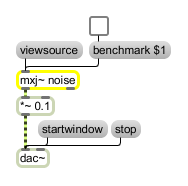Examples

An mxj~ object producing noise
Java in MSP
| Name | Type | Opt | Description |
|---|---|---|---|
| Java-class | symbol | The mxj~ object must be given the name of a valid Java class as the first argument. The Java class file must exist somewhere within the classpath, and it must be a class that was designed for use with the mxj~ object (the class must subclass com.cycling74.max.MaxObject). The number of inlets that an instance of mxj~ creates and the messages that it will respond to are determined by declarations made in the peer Java class. | |
| attributes | list | The mxj~ object supports the definition of attributes within the Java code for a peer class. The attributes that are settable at the time of instantiation using the @ paradigm. For instance, if a particular class Foo defined an integer attribute called intBar, one could create an instance of the class with the attribute set to the value 74 by typing in an object box. |
| bang | User-defined according to the Java class instantiated. | |
| int | input [int] |
User-defined according to the Java class instantiated. |
| float | input [float] |
User-defined according to the Java class instantiated. |
| list | input [list] |
User-defined according to the Java class instantiated. |
| anything | input [list] |
User-defined according to the Java class instantiated. |
| benchmark |
0/1 [int] post-interval [int] |
The word , followed by a zero or one and a number that specifies a posting interval (number of executions of the perform method), disables benchmarking the mxj~ object's perform method, posting into the Max Window. The default is zero (disabled) |
| (mouse) | Double-clicking with the mouse on the mxj~ object displays its contents as text in an editing window which the user can modify. | |
| exceptioncheck | 0/1 [int] |
The word , followed by a zero or one, disables/enables Java exception checking in the mxj~ object's perform method. The default is zero (disabled). |
| get | attribute-name [list] |
The word followed by an attribute-name will post the attribute value in the Max window. |
| viewsource | The message brings up a text editor window and loads the source code for the peer Java object. If the source code is not in the same directory as the peer class's .java file, a decompilation of the class file is attempted and the resulting decompiled source is presented. From within the editor window it's possible to make edits to the source, save the file, and recompile the class. | |
| zap | When a message is sent to an mxj~ object with Java peer class Foo, the next mxj~ object that's instantiated with the same peer Java class Foo (ie typing "mxj Foo" in an object box) will cause the class to reload itself from disk. This is most useful in a programming context: if one makes a change to Foo.java and recompiles a new Foo.class the message allows one to create an instance of the new class without having to quit and restart the Max environment. Without sending the message Max would simply use the cached definition of the class that was loaded when a Foo object was instantiated prior to the changes being made. |

| Name | Description |
|---|---|
| mxj | Java in Max |